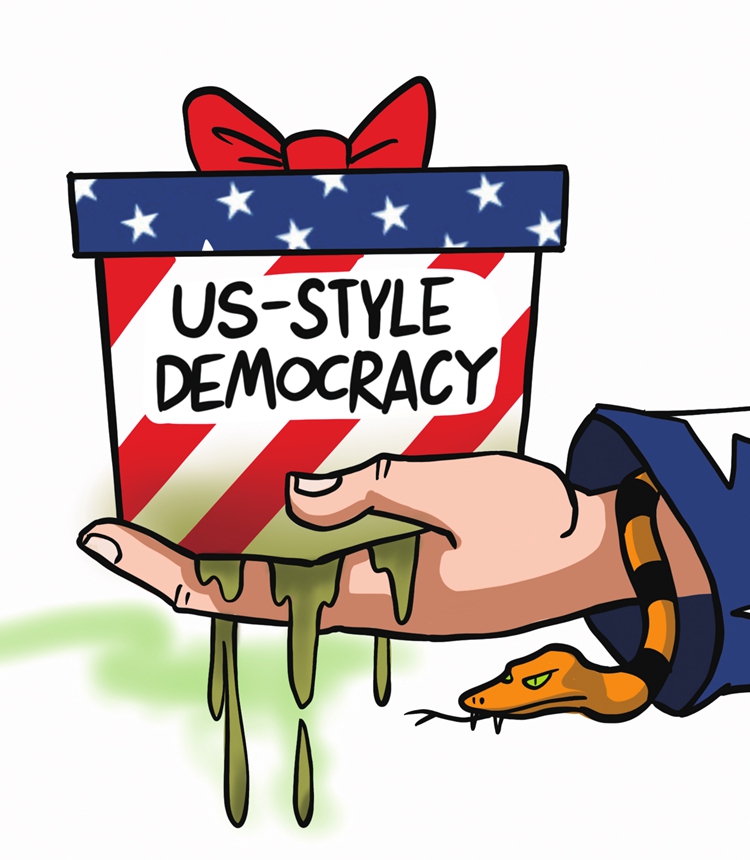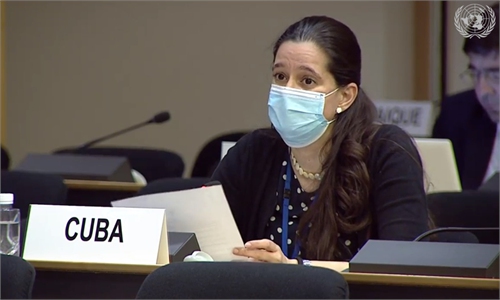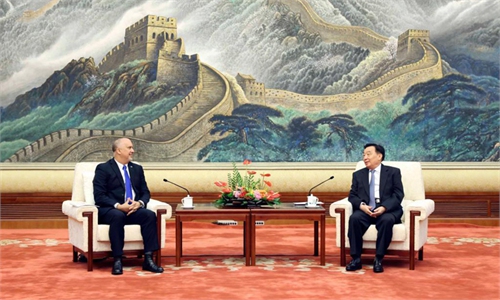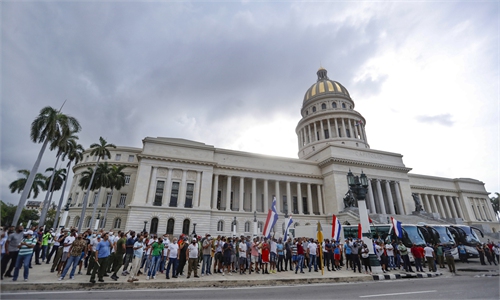
Illustration: Liu Rui/GT
Hundreds of Cubans took to the streets on Sunday to "protest against the COVID-19 restrictions and economic hardships," and the protests were instigated through social networks, according to Prensa Latina, or Latin American News Agency, headquartered in Havana, Cuba.The demonstrations were mainly triggered by people's discontent over Cuba's economic hardships and shortages of basic supplies. These are mainly a result of the US' decades-long sanctions against Cuba. Despite dialogue during the Obama era, the Trump administration tightened sanctions on Cuba, further crippling their economy.
Although President Joe Biden has said he wants a significant reset with Havana, his administration is still continuing Trump's hard-line approach. Plus the impact of the coronavirus epidemic, Cubans now face much harder times. The US bears a large proportion of responsibility for Cubans' hardships.
Cuban President Miguel Diaz-Canel said on Sunday that the protests were a form of "systemic provocation" by dissidents doing the bidding of the US. He said Washington in recent months had sought to destabilize and weaken the island's economy as part of a policy designed to "provoke a massive social implosion," according to New York Times.
Diaz-Canel must have some solid evidence to prove US' provocations behind the scenes. Judged by the US' prior moves, it is likely to have done something to "guide" the protests in Cuba.
Domestic pressure is increasing on Biden to fulfill his promise to restore warmer relations with Cuba. Biden may have the will to ease US-Cuba ties, and also could be waiting for the opportune time to use more bargaining chips to commence negotiations with Havana. Washington might think that a difficult situation in Cuba will make it easier for them to introduce their policies - particularly economic reforms and opening up its economy. Inciting protests may be the one that can make Cuba's domestic situation worse.
By "guiding" Cuba's economic reforms, the US has wanted to create a large-scale private sector or self-employed workforce in Cuba, turn them into forces that will help subvert the governance of the Communist Party of Cuba (PCC) and launch a "color revolution" in Cuba.
British political and international relations analyst Tom Fowdy tweeted on Tuesday, "The US strangles socialist countries with sanctions and then propagates a narrative saying 'socialism doesn't work' - and so many people fall for it." I totally agree with this idea.
The root cause of the US imposing decades-long sanctions over Cuba stems from the fact that the US does not tolerate a country whose ideology, political and social systems are totally different from itself - especially in "its backyard." Furthermore, during the Cold War era, Cuba stood on the opposite side of the US. Against this backdrop, from the perspective of the US government, the difficult governance of the PCC and the decline of Cubans' well-beings can demonstrate the vitality of the US political system. By contrast, a sound development of the PCC's governance will be a blow to the US. For this reason, US' sanctions on Cuba have remained for decades. The purpose is to restrict Cuba's development.
Apart from Cuba, the US has also imposed sanctions on other socialist countries, such as China and North Korea, in a bid to prove the outside world that "socialism doesn't work." But actually, these sanctions cannot force socialist countries to change their "color." Take Cuba for example. The most difficult period for the PCC is not the present. They came in the days after the collapse of the Soviet Union. But under the leadership of the PCC, Cubans survived that difficult time. The PCC has also made remarkable achievements in social developments - especially in terms of education and health care. For example, Cuba was the first Latin American country to have developed and manufactured its own COVID-19 vaccines. In May, it began a mass vaccination campaign in Havana.
Cuba has made many achievements amid such difficult situations. This indicates that Washington's intent to subvert the ruling of PCC, or any other communist party in another socialist country, will not work.
Even so, socialist countries as well as their people should still remain highly vigilant and resolutely resist the US' attempts of "peaceful evolution" with their exports of democracy.
The author is an assistant research fellow at the Institute of Latin American Studies, China Institutes of Contemporary International Relations. opinion@globaltimes.com.cn



